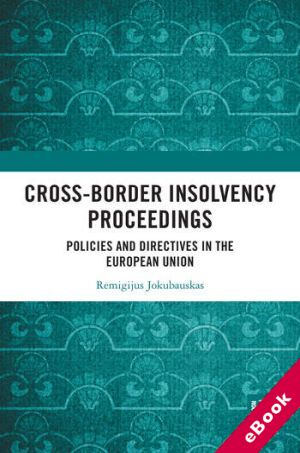
The device(s) you use to access the eBook content must be authorized with an Adobe ID before you download the product otherwise it will fail to register correctly.
For further information see https://www.wildy.com/ebook-formats
Once the order is confirmed an automated e-mail will be sent to you to allow you to download the eBook.
All eBooks are supplied firm sale and cannot be returned. If you believe there is a fault with your eBook then contact us on ebooks@wildy.com and we will help in resolving the issue. This does not affect your statutory rights.
This book presents an analysis of the effectiveness of European Union cross-border insolvency proceedings. It provides a thorough assessment of the development of cross-border insolvency proceedings established in the Regulation on Insolvency Proceedings ((EU) 2015/848) and how they contribute to the general goals of the EU internal market.
Insolvency law has not been subject to a global mandatory harmonization process, with no globally biding legal act. Instead, the landscape of international insolvency law is characterized by a patchwork of national laws that seek to accommodate cross-border insolvencies and soft law agreements. In the EU cross-border insolvency law holds significant importance in ensuring the smooth operation of the internal market. Fostering international investments and legal foreseeability in insolvency proceedings, it upholds the fundamental freedoms within EU law. This book covers the main elements of EU cross-border insolvency law, such as jurisdiction, applicable law, recognition and enforcement of judgments. It also focuses on previously unexplored areas, such as the exercise of creditors' rights in cross-border insolvency cases and the tracing and recovery of assets and discusses the application of the Restructuring and Insolvency Directive ((EU) 2019/1023) in relation to the rescue of viable companies and the discharge of debts for insolvent entrepreneurs.
This book will be of interest to students and practitioners of insolvency law, EU law and private international law. It will also be useful for national legislators and EU institutions working on the development of EU insolvency law.